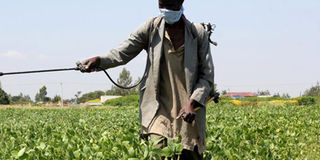Tax on pesticides will lead to high food prices

Gordon Lusi sprays pesticide on a farm planted with soya beans at Ahero in 2016. A 16 per cent tax on pesticides has seen food prices rise. PHOTO | FILE | NATION MEDIA GROUP
What you need to know:
- Pests and diseases contribute from 40 to 100 per cent crop loss if pesticides are not used, and that the tax makes local produce less competitive.
- They pointed out that agrochemicals constitute up to 40 percent of farm inputs.
- Maize farmers who have been battling the army worm attack are likely to be big losers because of the new tax.
A 16 per cent tax on pesticides by the government, which came into effect last month, had seen food prices rise even before the one on petroleum products.
The tax, which will worsen an already bad situation in the agricultural sector, is contained in the Tax Laws (Amendment) Act 2018.
Stakeholders in the agricultural sector have warned that it will hurt farmers and consumers alike, since it will increase production costs, which will automatically translate to higher food prices.
In a joint statement, the Cereal Growers Association, the Agrochemical Association of Kenya, the Fresh Produce Exporters Association and the Kenya Flower Council have called for its abolition, saying it defeats all efforts to achieve food security, a key pillar of President Kenyatta’s "Big Four" agenda.
The players noted that pests and diseases contribute from 40 to 100 percent crop loss if pesticides are not used, and that the tax makes local produce less competitive.
FARM INPUTS
They pointed out that agrochemicals constitute up to 40 percent of farm inputs.
“The introduction of 16 percent VAT on pest-control products will increase the cost of agricultural production for poor farmers and also lead to higher consumer prices for agricultural produce,” said Ms Evelyn Lusenaka, the CEO of the Agrochemical Association of Kenya.
Ms Lusenaka said it compounds the many challenges Kenyan farmers are facing, including prolonged drought, an armyworm invasion, heavy floods and an influx of cheap food imports.
Maize farmers who have been battling the army worm attack are likely to be big losers because of the new tax, having already chalked up huge expenses buying additional pesticides.
The cost of beef and vegetables, which are staple in many homes, will also go up, as will that of horticultural products, which require heavy use of agro chemicals to prevent pests and diseases.
TWO-PRONGED APPROACH
In a telephone interview, Ms Lusenaka said they have moved to court to stop the implementation of the tax.
“We’ve been forced to seek redress in court because after the president assented to the law, the earliest Parliament can review it is after six months, which is January next year,” she said, adding the matter was certified as urgent by Justice Chacha Mwita.
Meanwhile, farmers are planning a two-pronged approach to tackle the matter.
They are planning to collect one million signatures to petition President Kenyatta to abolish the punitive sections of the new tax laws if their efforts to lobby Parliament and the national Treasury fail.
NEGATIVE EFFECTS
Through their umbrella body, the Cereal Growers Association, they have reached out to the Parliamentary Committee on Agriculture and the Cabinet secretaries for Agriculture and the national Treasury for talks to resolve the issue.
According to the association's chairman, Mr Antony Kioko, they want Parliament to to reverse the negative effects of the earlier amendments, including increased dependence on food imports, food safety, and health concerns due to exposure to substandard pesticides.
"In our view, there is no clear benefit for introducing the tax because driving prices upwards will only reduce the VAT and income tax attributable to it,” Mr Kioko said, adding they are planning on lobbying MPs to amend the law.
PROJECTED TAX REVENUES
Mr Kioko said the stakeholders will collect signatures from farmers to petition the President if the lobbying efforts fail.
"We understand that MPs might not have appreciated the full consequences of this law when they passed it, but they have now seen how it is affecting millions of people,” Mr Kioko said.
He denying farmers a livelihood is pointless, adding that the projected tax revenues will not be achieved if the government further suppresses agriculture.






